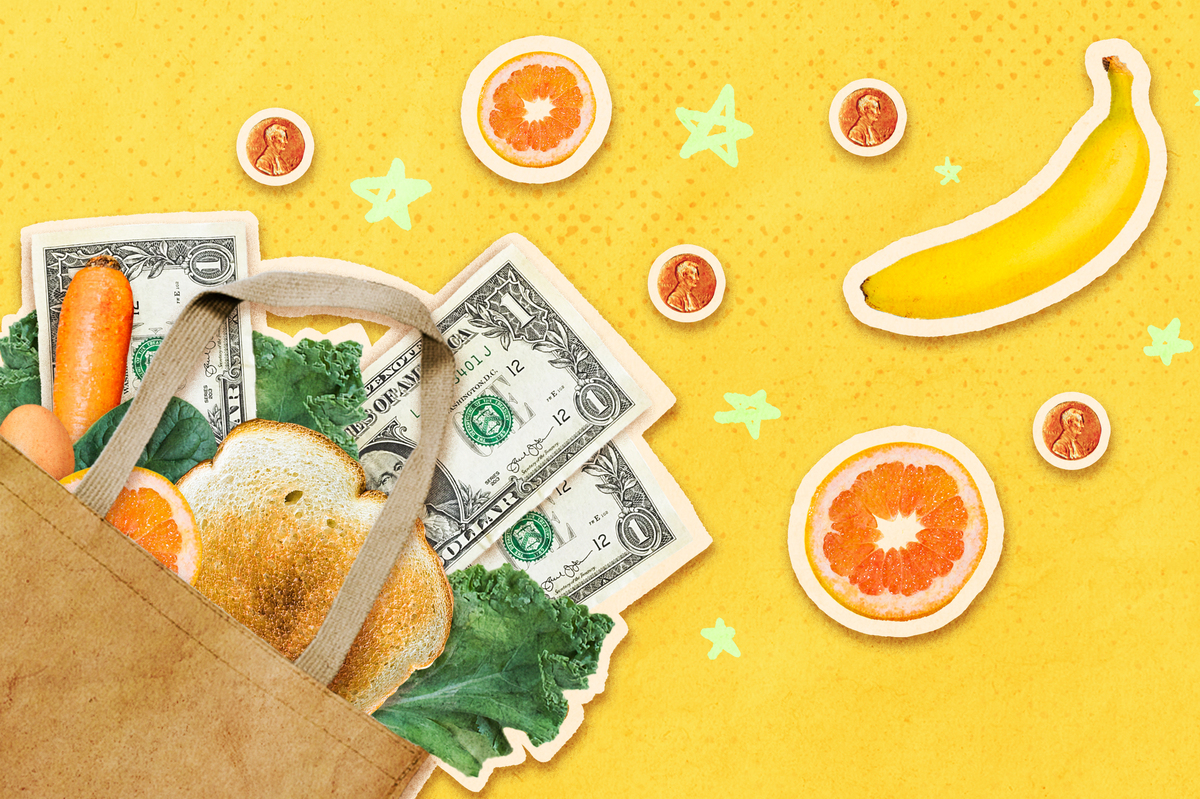Photographs Unsplash; Collage by Kaz Fantone/NPR

Photographs Unsplash; Collage by Kaz Fantone/NPR
It’s easy to rack up a hefty bill when buying groceries, but there are ways to make budget-friendly meals that won’t leave you longing for takeout.
Life Kit host Marielle Segarra spoke with Beth Moncel, the founder of Budget Bytes, a website with “recipes designed for small budgets” for tips on how to make the most out of your groceries.
Figure out the cost of your meals
To understand how much you spend per meal, try a common technique used by commercial food service operations: cost out a recipe. (Budget Bytes has an in-depth explainer on this).
- First, calculate the cost of each ingredient in your recipe. If the recipe calls for one carrot, and you paid $1.50 for a 10-carrot bag, you would do this calculation:
- $1.50/10 = 15 cents per carrot.
- Next, add up the cost of all the ingredients in the recipe. So maybe that’s 15 cents for the carrot, 37 cents for the onion, $1 for the can of crushed tomatoes, and so on.
- Once you have the total cost of the recipe, divide it by the number of servings. For instance, the ingredients for Moncel’s lentil bolognese cost about $5.58, and the recipe makes four servings. That breaks down to $1.40 per serving.

You don’t have to use this method for every recipe you cook, but Moncel suggests that everyone try it at least once “because it’s so eye-opening.” You might notice that some recipes are much pricier per serving, and you may decide to cook only one per week as a result.
Substitute to save money
After using the costing technique, you’ll find that some ingredients are more expensive than others, and you can cut back on those or find substitutes.
Animal products like meats and cheeses will often cost more than vegetables or grains, says Moncel. Nuts will often be pricier, too.

Cutting back doesn’t mean going without though. For instance, if a chili recipe calls for a pound of ground beef, she says you could reduce the beef by half and then bulk up the recipe with less expensive ingredients like beans, lentils, or rice. That way, you’ll still get the flavor of the beef without the cost.
Use ingredients creatively
Try to use all the groceries you buy. For leftovers, rely on the freezer, says Moncel. “A lot more foods are freezable than people realize. I often freeze leftover cheese. Leftover bread products freeze really well.”
If you can’t freeze what you have left over, look up additional recipes with those ingredients as keywords. For example, search for “recipes with celery” online if you have leftover celery.

Also, look for ingredients that can be used in multiple recipes. Moncel says she loves cooking with cabbage because “it’s versatile, it can go with so many different flavors, there’s a lot of different ways you can prepare it – and it’s so filling.”
Look for deals before you shop
Moncel says you can download the free application Flipp, which aggregates sale flyers from the stores in your area. “That can also help inform your decision of where to shop that week,” Moncel says.
You can also compare the prices of different brands before you go shopping, Moncel suggests. “Just type each ingredient into the search bar on your grocery store’s website,” she says. “It will show you what they have available at that store. And you can price compare on your computer before you’re in that overstimulating environment.”

The audio portion of this episode was hosted by Marielle Segarra, produced by Sylvie Douglis and edited by Meghan Keane.
We’d love to hear from you. email us at LifeKit@npr.org. Listen to Life Kit on Apple Podcasts and Spotify, or sign up for our newsletter.
Credit: Source link



